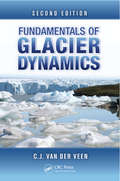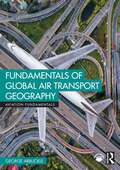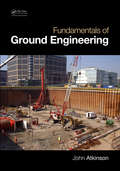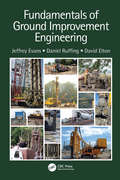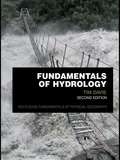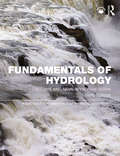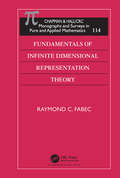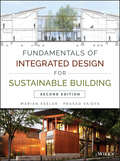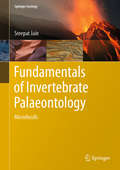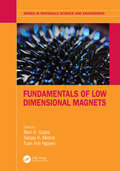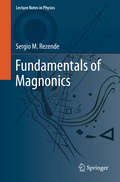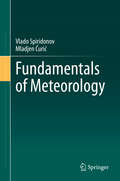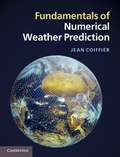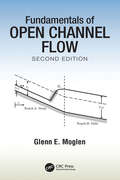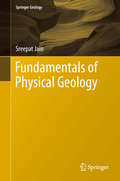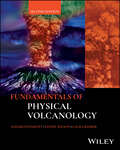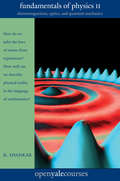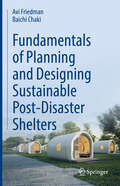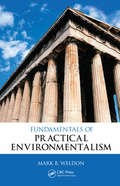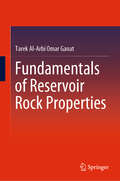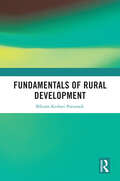- Table View
- List View
Fundamentals of Glacier Dynamics
by C.J. van der VeenMeasuring, monitoring, and modeling technologies and methods changed the field of glaciology significantly in the 14 years since the publication of the first edition of Fundamentals of Glacier Dynamics. Designed to help readers achieve the basic level of understanding required to describe and model the flow and dynamics of glaciers, this second edi
Fundamentals of Global Air Transport Geography (Aviation Fundamentals)
by George ArbuckleThe commercial air transport industry can be broadly split into three component parts: airlines, airports and aircraft. Each of these components is shaped by geography, insofar as each is influenced by places, landscapes, environments, people and their various interactions. Conversely, air transport plays a large role in shaping the various themes of geography and the position of our physical, human and environmental world. It connects people, cultures and businesses across every continent and generates economic growth, allows international trade to occur and develops tourism. It can also be involved in creating negative outputs, such as emissions, noise and loss of biodiversity, which can have a large impact on the planet and quality of life. A lack of air transport links can also have a significantly negative impact on world regions in terms of economic and cultural development. In short, air transport and geography are inextricably linked.Fundamentals of Global Air Transport Geography details the geography of the global commercial air transport industry. The book aims to provide an understanding of these key areas at an introductory level, in order to be accessible to students and non-technical airport/airline management. A key theme throughout the book will not only be how geographical issues have influenced air transport, but also how air transport continues to influence geography. Each chapter boasts a range of features aimed at enhancing the reader’s understanding, including learning objectives, discussion questions and case studies, and lecturers can find supporting resources including PowerPoint slides and teaching notes online.
Fundamentals of Ground Engineering
by John AtkinsonFundamentals of Ground Engineering is an unconventional study guide that serves up the key principles, theories, definitions, and analyses of geotechnical engineering in bite-sized pieces. This book contains brief-one or two pages per topic-snippets of information covering the geotechnical engineering component of a typical undergraduate course in
Fundamentals of Ground Improvement Engineering
by David Elton Jeffrey Evans Daniel RuffingGround improvement has been one of the most dynamic and rapidly evolving areas of geotechnical engineering and construction over the past 40 years. The need to develop sites with marginal soils has made ground improvement an increasingly important core component of geotechnical engineering curricula. Fundamentals of Ground Improvement Engineering addresses the most effective and latest cutting-edge techniques for ground improvement. Key ground improvement methods are introduced that provide readers with a thorough understanding of the theory, design principles, and construction approaches that underpin each method. Major topics are compaction, permeation grouting, vibratory methods, soil mixing, stabilization and solidification, cutoff walls, dewatering, consolidation, geosynthetics, jet grouting, ground freezing, compaction grouting, and earth retention. The book is ideal for undergraduate and graduate-level university students, as well as practitioners seeking fundamental background in these techniques. The numerous problems, with worked examples, photographs, schematics, charts and graphs make it an excellent reference and teaching tool.
Fundamentals of Hydrology
by Tim DavieIn order to manage the world's increasingly scarce water resources we must have a sound understanding of how water moves around the planet and what influences water quality. Fundamentals of Hydrology provides an engaging and comprehensive introduction to this subject and provides real-life examples of water resource management in a changing world. The second edition of this popular book brings the text up-to-date with additional case studies and diagrams and a greater synthesis of water quality with physical hydrology. The chapters on runoff and evaporation have been updated and the final chapter on hydrology in a changing world has more material on water resource management strategies. Additionally the chapter on streamflow analysis now includes a more in-depth section on modelling runoff. The book begins with a comprehensive coverage of precipitation, evaporation, water stored in the ground and as snow and ice, and runoff. These physical hydrological processes show with respect to the fundamental knowledge about the process, its measurement and estimation and how it ties in with water quality. Following this is a section on analyzing streamflow data, including using computer models and combining hydrology and ecology for in-stream flow assessment. A chapter on water quality shows how to measure and estimate it in a variable environment and finishes with a section on pollution treatment. The final chapter brings the text together to discuss water resource management andreal-life issues that are faced by hydrologists in a constantly changing world. Fundamentals of Hydrology is a lively and accessible introduction to the study of hydrology at university level. This new edition continues to provide an understanding of hydrological processes, knowledge of the techniques used to assess water resources and an up-to-date overview of water resource management in a changing world. Throughout the text, wide-ranging examples and case studies are used to clearly explain ideas and methods. Short chapter summaries, essay questions, guides to further reading and a glossary are also included.
Fundamentals of Hydrology (Routledge Fundamentals of Physical Geography)
by Tim DavieThe third edition of Fundamentals of Hydrology provides an absorbing and comprehensive introduction to the understanding of how fresh water moves on and around the planet and how humans affect and manage the freshwater resources available to them. The book consists of three parts, each of fundamental importance in the understanding of hydrology: The first section deals with processes within the hydrological cycle, our understanding of them, and how to measure and estimate the amount of water within each process. This also includes an analysis of how each process impacts upon water quality issues. The second section is concerned with the measurement and analytical assessment of important hydrological parameters such as streamflow and water quality. It describes analytical and modelling techniques used by practising hydrologists in the assessment of water resources. The final section of the book draws together the first two parts to discuss the management of freshwater with respect to both water quality and quantity in a changing world. Fundamentals of Hydrology is a lively and accessible introduction to the study of hydrology at university level. It gives undergraduates a thorough understanding of hydrological processes, knowledge of the techniques used to assess water resources, and an up-to-date overview of water resource management. Throughout the text, examples and case studies from all around the world are used to clearly explain ideas and techniques. Essay questions, guides to further reading, and website links are also included.
Fundamentals of Infinite Dimensional Representation Theory (Monographs and Surveys in Pure and Applied Mathematics #114)
by Raymond C. FabecInfinite dimensional representation theory blossomed in the latter half of the twentieth century, developing in part with quantum mechanics and becoming one of the mainstays of modern mathematics. Fundamentals of Infinite Dimensional Representation Theory provides an accessible account of the topics in analytic group representation theory and operator algebras from which much of the subject has evolved. It presents new and old results in a coherent and natural manner and studies a number of tools useful in various areas of this diversely applied subject.From Borel spaces and selection theorems to Mackey's theory of induction, measures on homogeneous spaces, and the theory of left Hilbert algebras, the author's self-contained treatment allows readers to choose from a wide variety of topics and pursue them independently according to their needs. Beyond serving as both a general reference and as a text for those requiring a background in group-operator algebra representation theory, for careful readers, this monograph helps reveal not only the subject's utility, but also its inherent beauty.
Fundamentals of Integrated Design for Sustainable Building
by Marian KeelerThe Fully Updated, Indispensible Study of Sustainable Design Principles Fundamentals of Integrated Design for Sustainable Building is the first textbook to merge principles, theory, and practice into an integrated workflow. This book introduces the technologies and processes of sustainable design and shows how to incorporate sustainable concepts at every design stage. This comprehensive primer takes an active learning approach that keeps students engaged. This book dispenses essential information from practicing industry specialists to provide a comprehensive introduction to the future of design. This new second edition includes: Expansive knowledge--from history and philosophy to technology and practice Fully updated international codes, like the CAL code, and current legislations Up-to-date global practices, such as the tools used for Life-Cycle Assessment Thorough coverage of critical issues such as climate change, resiliency, health, and net zero energy building Extensive design problems, research exercise, study questions, team projects, and discussion questions that get students truly involved with the material Sustainable design is a responsible, forward-thinking method for building the best structure possible in the most efficient way. Conventional resources are depleting and building professionals are thinking farther ahead. This means that sustainable design will eventually be the new standard and everyone in the field must be familiar with the concepts to stay relevant. Fundamentals of Integrated Design for Sustainable Building is the ideal primer, with complete coverage of the most up to date information.
Fundamentals of Invertebrate Palaeontology: Microfossils (Springer Geology)
by Sreepat JainThis book provides practical morphological information, together with detailed illustrations and brief explanatory texts. Each chapter starts with a brief introduction, and goes on to describe the respective organism’s morphology in detail through numerous illustrations. This is followed by a brief note on its classification, and concludes with illustrated examples of stratigraphically important organisms through time with their major distinguishing characteristics. Featuring over 2500 clearly labelled, hand-drawn and classroom-friendly illustrations, the book offers a fundamental resource for budding palaeontologists, petroleum geologists and palaeobiologists.
Fundamentals of Low Dimensional Magnets (Series in Materials Science and Engineering)
by Sanjay Mishra Ram K. Gupta Tuan Anh NguyenA low-dimensional magnet is a key to the next generation of electronic devices. In some respects, low-dimensional magnets refer to nanomagnets (nanostructured magnets) or single-molecule magnets (molecular nanomagnets). They also include the group of magnetic nanoparticles, which have been widely used in biomedicine, technology, industries, and environmental remediation.Low-dimensional magnetic materials can be used effectively in the future in powerful computers (hard drives, magnetic random-access memory, ultra-low power consumption switches, etc.). The properties of these materials largely depend on the doping level, phase, defects, and morphology. This book covers various nanomagnets and magnetic materials. The basic concepts, various synthetic approaches, characterizations, and mathematical understanding of nanomaterials are provided. Some fundamental applications of 1D, 2D, and 3D materials are covered.This book provides the fundamentals of low-dimensional magnets along with synthesis, theories, structure-property relations, and applications of ferromagnetic nanomaterials. This book broadens our fundamental understanding of ferromagnetism and mechanisms for realization and advancement in devices with improved energy efficiency and high storage capacity.
Fundamentals of Magnonics (Lecture Notes in Physics #969)
by Sergio M. RezendeFundamentals of Magnonics is a textbook for beginning graduate students in the areas of magnetism and spintronics. The level of presentation assumes only basic knowledge of the origin of magnetism and electromagnetism, and quantum mechanics. The book utilizes elementary mathematical derivations, aimed mainly at explaining the physical concepts involved in the phenomena studied and enabling a deeper understanding of the experiments presented. Key topics include the basic phenomena of ferromagnetic resonance in bulk materials and thin films, semi-classical theory of spin waves, quantum theory of spin waves and magnons, magnons in antiferromagnets, parametric excitation of magnons, nonlinear and chaotic phenomena, Bose-Einstein condensation of magnons, and magnon spintronics. Featuring end-of-chapter problem sets accompanied by extensive contemporary and historical references, this book provides the essential tools for any graduate or advanced undergraduate-level course of studies on the emerging field of magnonics.
Fundamentals of Meteorology
by Vlado Spiridonov Mladjen ĆurićThis book is dedicated to the atmosphere of our planet, and discusses historical and contemporary achievements in meteorological science and technology for the betterment of society. The book explores many significant atmospheric phenomena and physical processes from the local to global scale, as well as from the perspective of short and long-term time scales, and links these processes to various applications in other scientific disciplines with linkages to meteorology. In addition to addressing general topics such as climate system dynamics and climate change, the book also discusses atmospheric boundary layer, atmospheric waves, atmospheric chemistry, optics/photometeors, electricity, atmospheric modeling and numeric weather prediction. Through its interdisciplinary approach, the book will be of interest to researchers, students and academics in meteorology and atmospheric science, environmental physics, climate change dynamics, air pollution and human health impacts of atmospheric aerosols.
Fundamentals of Numerical Weather Prediction
by Jean Coiffier Christopher SutcliffeNumerical models have become essential tools in environmental science, particularly in weather forecasting and climate prediction. This book provides a comprehensive overview of the techniques used in these fields, with emphasis on the design of the most recent numerical models of the atmosphere. It presents a short history of numerical weather prediction and its evolution, before describing the various model equations and how to solve them numerically. It outlines the main elements of a meteorological forecast suite, and the theory is illustrated throughout with practical examples of operational models and parameterizations of physical processes. This book is founded on the author's many years of experience, as a scientist at M t o-France and teaching university-level courses. It is a practical and accessible textbook for graduate courses and a handy resource for researchers and professionals in atmospheric physics, meteorology and climatology, as well as the related disciplines of fluid dynamics, hydrology and oceanography.
Fundamentals of Numerical Weather Prediction
by Jean CoiffierNumerical models have become essential tools in environmental science, particularly in weather forecasting and climate prediction. This book provides a comprehensive overview of the techniques used in these fields, with emphasis on the design of the most recent numerical models of the atmosphere. It presents a short history of numerical weather prediction and its evolution, before describing the various model equations and how to solve them numerically. It outlines the main elements of a meteorological forecast suite, and the theory is illustrated throughout with practical examples of operational models and parameterizations of physical processes. This book is founded on the author's many years of experience, as a scientist at Météo-France and teaching university-level courses. It is a practical and accessible textbook for graduate courses and a handy resource for researchers and professionals in atmospheric physics, meteorology and climatology, as well as the related disciplines of fluid dynamics, hydrology and oceanography.
Fundamentals of Open Channel Flow
by Glenn E. MoglenThis second edition of Fundamentals of Open Channel Flow focuses on theory followed by clear, fully-solved examples, and practical computational tools such as spreadsheets and industry standard software. It builds on a foundation in fluid mechanics and offers the basics of a first course in open channel flow for senior undergraduates or graduate students: energy, momentum, friction, and gradually varied flow, both qualitative and quantitative. This edition provides more coverage of design applications, including culvert design, a wider range of channel shapes, and an update of the US Corps of Engineers’ HEC-RAS program. It shows how a few simple equations can solve a range of basic problems. The energy-depth and momentum-depth relationships are examined graphically and the book's website offers unique animations showing actual flow dynamics of some transient flow problems, as well as solutions to end-of-chapter problems and PowerPoint slides for instructors.
Fundamentals of Petrophysics (Springer Mineralogy)
by Shenglai YangIn this book, the fundamental knowledge involved in petroleum & gas development engineering, such as physical and chemical phenomena, physical processes and the relationship between physical factors is covered. It is arranged into 3 Sections. Section 1 including chapter 1-4 is to introduce the properties of fluids (gases, hydrocarbon liquids, and aqueous solutions). Section II including Chapter 5-7 is to introduce the porous rock properties of reservoir rocks. Section III including Chapter 8-10 is to introduce the mechanism of multiphase fluid flow in porous medium. The book is written primarily to serve professionals working in the petroleum engineering field. It can also be used as reference book for postgraduate and undergraduate students as well for the related oil fields in petroleum geology, oil production engineering, reservoir engineering and enhancing oil recovery.
Fundamentals of Physical Geology
by Sreepat JainPhysical Geology is a vast subject and it is not possible to cover all aspects in one book. This book does not invent the wheel but merely put together sets of updated but concise material on Physical Geology with lots of illustrations. All illustrations are created by hand and give a real classroom feel to the book. Students or readers can easily reproduce them by hand. This is a book, where a diagram says it all. The book is divided into four parts. The first part "The Solar System and Cosmic Bodies" deals with elements of our Solar System and the cosmic bodies around it (like meteorites, asteroids, etc. ). The second part "The Earth Materials" deals with Earth and its internal structure. The third part "The Hydrologic System" is more exhaustive and deals with the hydrological system of the Earth including Weathering and Mass Wasting, Streams, Groundwater, Karst, Glaciers, Oceans and Aeolian Processes and Landforms. The fourth and the final part "The Tectonic System" deals with different aspects of Plate Tectonics, Earthquakes and Volcanoes.
Fundamentals of Physical Geology (Springer Geology)
by Sreepat JainPhysical Geology is a vast subject and it is not possible to cover all aspects in one book. This book does not invent the wheel but merely put together sets of updated but concise material on Physical Geology with lots of illustrations. All illustrations are created by hand and give a real classroom feel to the book. Students or readers can easily reproduce them by hand. This is a book, where a diagram says it all. The book is divided into four parts. The first part “The Solar System and Cosmic Bodies” deals with elements of our Solar System and the cosmic bodies around it (like meteorites, asteroids, etc.). The second part “The Earth Materials” deals with Earth and its internal structure. The third part “The Hydrologic System” is more exhaustive and deals with the hydrological system of the Earth including Weathering and Mass Wasting, Streams, Groundwater, Karst, Glaciers, Oceans and Aeolian Processes and Landforms. The fourth and the final part “The Tectonic System” deals with different aspects of Plate Tectonics, Earthquakes and Volcanoes.
Fundamentals of Physical Volcanology
by Lionel Wilson Elisabeth Parfitt Laura KerberThe world’s leading student text on physical volcanology offers an unmatched introduction to the field In the revised second edition of Fundamentals of Physical Volcanology, the authors provide a comprehensive introduction to the processes that control when and how volcanoes erupt. Understanding these processes involves bringing together ideas from a number of disciplines, including branches of geology, such as petrology and geochemistry, and aspects of physics, such as fluid dynamics and thermodynamics. With the help of new and improved illustrations, this new edition explains eruption types and mechanisms, subsurface processes, volcanic eruption products, and how volcanoes affect their surrounding environment. Readers will also find: Quantitative treatment of physical volcanological processesA review of the historical development of volcanologyExamples of current research trends and topics in volcanology Perfect for undergraduate earth sciences students and graduate students starting research programs in volcanology, Fundamentals of Physical Volcanology will also earn a place in the libraries of researchers in related fields seeking an accessible introduction to the principles of physical volcanology.
Fundamentals of Physics II: Electromagnetism, Optics, and Quantum Mechanics
by R. ShankarR. Shankar, a well-known physicist and contagiously enthusiastic educator, was among the first to offer a course through the innovative Open Yale Course program. His popular online video lectures on introductory physics have been viewed over a million times. In this second book based on his online Yale course, Shankar explains essential concepts, including electromagnetism, optics, and quantum mechanics. The book begins at the simplest level, develops the basics, and reinforces fundamentals, ensuring a solid foundation in the principles and methods of physics. It provides an ideal introduction for college-level students of physics, chemistry, and engineering; for motivated AP Physics students; and for general readers interested in advances in the sciences.
Fundamentals of Planning and Designing Sustainable Post-Disaster Shelters
by Avi Friedman Baichi ChakiThe book explores essential principles and practices for planning and designing sustainable refugee shelters. With millions of people forced to flee their homes annually due to conflict, environmental disasters, or persecution, the urgency of this global crisis cannot be overstated. Since refugees often reside in temporary shelters for years after years, it is imperative to construct refugee camps and shelters that address their long-term needs. This comprehensive guide delves into emergency shelter design and refugee camp planning concepts, exploring topics ranging from site selection and infrastructure development to shelter design and material choice. Drawing on real-world case studies and expert insights, this book offers a vital resource for architects, urban planners, humanitarian aid workers, policymakers, researchers, and students. As climate change exacerbates the refugee crisis, it becomes increasingly imperative to prioritize innovative, sustainable solutions for development and foster resilience.
Fundamentals of Pneumatics and Hydraulics
by Md. Abdus SalamThis book covers the basics of DC circuits, AC circuits, three-phase power to understand the basics and controls of electro-hydraulics and electro-pneumatics. This book covers detailed knowledge on the fluid power properties, Bernoulli’s equation, Torricelli’s theorem, viscosity, viscosity index, hydraulic pumps, hydraulic valves, hydraulic motors, pressure control valves, pneumatic systems, pneumatic cylinders, different types of gas laws, valve actuation, relay, magnetic contactor, different types of switches, logic gates, electro-pneumatic control circuits with different options and introduction to PLC. In addition, the detailed technique of Automation Studio software, different types of simulation circuits with hydraulics, pneumatics and electro-pneumatic are included. This book will be an excellent textbook for electromechanical, robotics, mechatronics, electrical control and mechanical students as well as for the professional who practices fluid power systems.
Fundamentals of Practical Environmentalism (Social Environmental Sustainability)
by Mark B. WeldonEnvironmental decisions present themselves every day in forms large and small. Should I walk to work today? What about global warming-should I write my congressperson and demand that the government do something? Should I put solar panels on my roof? Should I get a different car or turn up the temperature on the air conditioner or get water-saving f
Fundamentals of Reservoir Rock Properties
by Tarek Al-Arbi GanatThis book explains the basic technologies, concepts, approaches, and terms used in relation to reservoir rocks. Accessible to engineers in varying roles, it provides the tools necessary for building reservoir characterization and simulation models that improve resource definition and recovery, even in complex depositional environments.The book is enriched with numerous examples from a wide variety of applications, to help readers understand the topics. It also describes in detail the key relationships between the different rock properties and their variables. As such, it is of interest to researchers, engineers, lab technicians, and postgraduate students in the field of petroleum engineering.
Fundamentals of Rural Development
by Bikram Keshari PattanaikThe book expounds on the functioning of rural development as well as the practical problems encountered in the formulation of rural development policies and programmes. It provides an exhaustive account of the various sectors and actors of rural development and presents it as a multidimensional concept by documenting its different components. It also details the paradigms and strategies of rural development adopted by developed and developing countries of the world.This volume deals with rural cooperatives and livelihood in order to understand how the development process can be self-sustained and sustainable, following the vocal for local mantra. It also extensively discusses rural basic needs, poverty, employment, the role of Panchayati Raj institutions, the corporate sector, NGOs, peoples’ participation, and capacity building in rural development.This book will be useful to undergraduate and postgraduate students, researchers, and teachers of development studies, economics, sociology, political science, and public administration. It will be useful for the administrators and development administration officials of state and central government, planners, policymakers, and people working in NGOs and corporate sector functionaries dealing with corporate social responsibilities especially those handling developmental issues and challenges.
